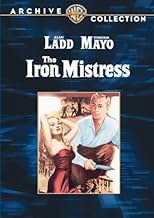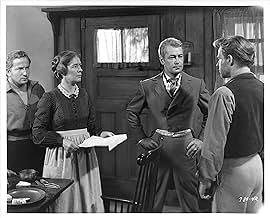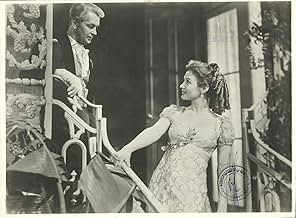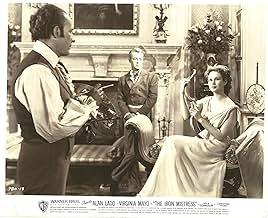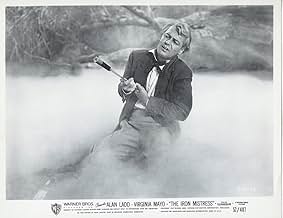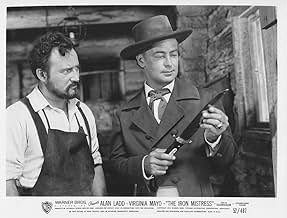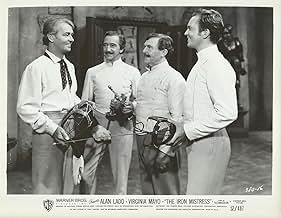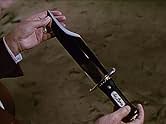IMDb RATING
6.2/10
1.1K
YOUR RATING
The exploits of nineteenth-century pioneer Jim Bowie after settling in New Orleans.The exploits of nineteenth-century pioneer Jim Bowie after settling in New Orleans.The exploits of nineteenth-century pioneer Jim Bowie after settling in New Orleans.
Anthony Caruso
- Black Jack Sturdevant
- (as Tony Caruso)
Nedrick Young
- Henri Contrecourt
- (as Ned Young)
John Alban
- Casino Patron
- (uncredited)
John Albright
- Casino Patron
- (uncredited)
Leon Alton
- Riverboat Passenger
- (uncredited)
John Alvin
- Impatient Man in Tailor's Shop
- (uncredited)
Ernest Anderson
- Riverboat Cabin Boy
- (uncredited)
Walter Bacon
- Casino Patron
- (uncredited)
Salvador Baguez
- Mexican Artist
- (uncredited)
Richard Bartell
- Horse Race Starter
- (uncredited)
John Barton
- Gambling House Patron
- (uncredited)
- Director
- Writers
- All cast & crew
- Production, box office & more at IMDbPro
Featured reviews
You got to like Alan Ladd first off. He gave a good show in this performance and with a good story and supporting actors, this remains premium entertainment. In addition to the Bowie legend, we are introduced to the Bowie knife. A large no-nonsense will get the job done specially made knife that in the right hands can do quite a bit of damages if you are a master of said knife. Alan Ladd is that man. In addition to a nice flowing story-line, we are introduced to many memorable scenes which make this a must see movie again and again. We get a glimpse of the way it was way back when the country was young, Way back when, there was opportunity everywhere, brave men who took risks and danger to put them in their place if they made one wrong move. Many did. The movie emphasizes a moral code in its story of which men will duel over if not honored and obeyed. It wasn't enough to win or kill but how you win and kill that mattered as a mans reputation was the most important asset he had. Banks would loan on it, people would support it and others would imitate it making a person's character very valuable. Boy has that been compromised over the ages but not wiped out. If one finds an honest man who practices righteousness, faith is restored and good will toward men takes place. If many are found keeping this, then we are either closer to paradise or we are in Christmas! Pay attention to the leading ladies vanity. She has everything yet she has nothing and we are treated to a close-up glance of vanity at work and even more, pride in large doses too. Worthy time spent on this little gem. I have seen it perhaps ten times and am watching it now. What joy. Waste no more time reading this. Go and be entertained. Highly recommend eating while watching, a decent snack and a tasty drink. Please enjoy and if you recorded this off of TCM, watch it and save it and watch again in about 3 weeks. You will thank me!
I live in Bowie County, one of 37 counties in Texas that were made while Texas was a Republic, and this County was named for James Bowie, a hero of the Alamo and a Hero of the the Republic. The rest of the story is not so heroic. James Bowie was a forger, thief, horrible human being and land thief. In this area of Texas, he is loved for being at the end of the Alamo and being an irascible scoundrel who forged land grants, forged Spanish grants and just did some terrible, fitful things. He killed a lot of people in duels but having his name being kindly lent? Nope. Now in Texas, where I live, the Bowie knife is a real and really big thing. I own one and strap it to my leg when I go out to the wilderness. And it is a big wilderness. The area where Jim Bowie plied his trade (thievery) is full of big pines and lots, and I mean lots of water. We go out to the big lakes, but not one has been made by man. Only Caddo Lake, South East of where I live, is man made. That's where Jim Bowie made his claim. I don't want to go any further into this but Jim, or James Bowie as he has been called in this area, is claimed as a hero. But this movie is terrible at accuracy, wonderful for remembrance.
The Iron Mistress (1952)
I don't get the whole call of honor that leads to duels at the slightest provocation (or less). In some movies it's a fabulous dramatic point, but here it's a nagging and recurring trick, a reason for some male chest-thumping and a little bloodshed. It also represents the way the movie depends on forced drama to make the events jump.
There are exceptions, like a really beautiful and unusual hand-to-hand knife/sword fight occurring in a darkened room, with an occasional bolt of lightning like a strobe going off. This is cinema trickery, a real pleasure, not part of the real story, but it's a moment of relief from the costume drama and dueling the rest of the time.
This is how this movie goes. Moments of unique drama are followed by long stretches of stiff plot development. I'm not sure how the movie reflects the real story of James Bowie, whose name was given to the famous Bowie knife (knives naturally have a big role in the movie, including the forging of the first true Bowie knife). But what works best is the sense of period sets and time-travel to pre-Civil War Louisiana. The romance isn't highly romantic, and the plot is generally stiff, but it is a kind of history story come to life. If you overlook the obvious liberties and gaffes, it's not an unwatchable movie, just a routine one. Alan Ladd, it must be said, is a little cool even for Alan Ladd (an understated actor).
The film does lay out the gradual shift in cultivation of the South to cotton farming, and brings out lots of old rules like the fact divorce was impossible in Louisiana without an act of the legislature. People interested in this certain kind of movie making, for its own sake, should check out "Drums Along the Mohawk" (a better movie by far, but with a similar feel somehow). Here, the camera-work by the talented John Seitz is strangely dull (though it is in true Technicolor), and the scored music by the incomparable Max Steiner is straight up functional. Most of all, the many ordinary parts are put together without great art or intensity.
I don't get the whole call of honor that leads to duels at the slightest provocation (or less). In some movies it's a fabulous dramatic point, but here it's a nagging and recurring trick, a reason for some male chest-thumping and a little bloodshed. It also represents the way the movie depends on forced drama to make the events jump.
There are exceptions, like a really beautiful and unusual hand-to-hand knife/sword fight occurring in a darkened room, with an occasional bolt of lightning like a strobe going off. This is cinema trickery, a real pleasure, not part of the real story, but it's a moment of relief from the costume drama and dueling the rest of the time.
This is how this movie goes. Moments of unique drama are followed by long stretches of stiff plot development. I'm not sure how the movie reflects the real story of James Bowie, whose name was given to the famous Bowie knife (knives naturally have a big role in the movie, including the forging of the first true Bowie knife). But what works best is the sense of period sets and time-travel to pre-Civil War Louisiana. The romance isn't highly romantic, and the plot is generally stiff, but it is a kind of history story come to life. If you overlook the obvious liberties and gaffes, it's not an unwatchable movie, just a routine one. Alan Ladd, it must be said, is a little cool even for Alan Ladd (an understated actor).
The film does lay out the gradual shift in cultivation of the South to cotton farming, and brings out lots of old rules like the fact divorce was impossible in Louisiana without an act of the legislature. People interested in this certain kind of movie making, for its own sake, should check out "Drums Along the Mohawk" (a better movie by far, but with a similar feel somehow). Here, the camera-work by the talented John Seitz is strangely dull (though it is in true Technicolor), and the scored music by the incomparable Max Steiner is straight up functional. Most of all, the many ordinary parts are put together without great art or intensity.
Excellent entertainment for the movie-goer regarding Jim Bowie, his knife and a snapshot of his life real or imagined. It doesn't matter how accurate this is as it is not a biography or documentary but instead entertainment. Furthermore I like Alan Ladd which makes for a treat. There are some familiar faces for the cast for their time making it even more enjoyable. One thing I always look for in classic movie showings is whether the movie is watchable a second time. It all depends on memorable scenes and this movie has quite a few that make you want to "comeback" for more. Too bad it is not longer as they would have just loaded it up with more good viewing dynamics. I watch this every 2-3 years for decades and it is still holding my attention just like the first time out. Excellent movie to eat with while watching with a tasty drink. Snack ups it considerably too. Hey....
Alan Ladd heads a fine cast in this film biography of Jim Bowie, a life that was marked by thrilling adventure and violence which ended at the Alamo. Bowie's travels take him to New Orleans where fate takes a hand and changes the course of his life and American history. A central figure in the film is a beautiful but vain and selfish Creole girl with whom Bowie is hopelessly smitten. This girl is responsible for the deaths of several men over a period of many years, because of duels, accidental killings or outright murders. Bowie himself is obliged to fight duels for various reasons and his expertise with a knife becomes legendary. His reputation, forged by the iron mistress, follows him like a shadow throughout his life as he tries to put the young woman and his violent past behind him. The film has beautiful color, lavish sets and Max Steiner's brooding music score.
Did you know
- GoofsThe knife-maker claims the meteorite he found is made of steel. Steel is a man-made substance using iron and carbon. Metallic meteorites contain an iron-nickel alloy.
- Quotes
Jim Bowie: Ma...I killed a man.
Mrs. Bowie: Did he need killin'?
Jim Bowie: About as much as any man ever did.
- Crazy creditsPrologue: "Historical truth is sometimes stranger than fiction. James Bowie was an example--literally carving his name in history to become an American legend."
- ConnectionsReferenced in Le ballon rouge (1956)
- How long is The Iron Mistress?Powered by Alexa
Details
- Runtime
- 1h 50m(110 min)
- Aspect ratio
- 1.37 : 1
Contribute to this page
Suggest an edit or add missing content


